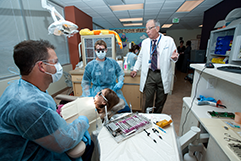Curriculum Organization
The A.T. Still University’s Arizona School of Dentistry & Oral Health (ATSU-ASDOH) Curriculum Committee is composed of faculty across various components of the program’s instruction. Together they address the ever-changing needs for the education of the pre-doctorate and doctorate programs at ATSU-ASDOH. The members meet regularly to evaluate and align the assessment of program content to program core competencies and strategic goals.
Under each of these course domains the students learn a variety of subjects, presented in an integrated fashion through systems-based or cased-based approaches as often as appropriate. Additionally, they learn clinical skills to be applied both in pre-clinical simulation environments as well as on live patients. They expand their practice and perspectives by serving in the community through partnerships with community health centers and various organizations with aligned missions toward whole person healthcare and improved access to care for at risk patients. Students also get opportunities to refine their skills in their own unique professional development pathways and learn some of the most innovative and latest skills related to digital dentistry, practice management and life-long learning.
Integrating basic sciences with pre-clinical and clinical curriculum
Following a recent overhaul of curriculum, ATSU-ASDOH is embracing a more integrated and comprehensive approach to the basic sciences within the clinical application of skills. There are several advantages to this approach, most notable being a more practical preparation for students in approaching the real-world clinical needs around patient-centered care.
To achieve the goal of better integration, beginning in the fall semester of 2020, ATSU-ASDOH has reorganized its curriculum around four central domains:
- Fundamentals of Patient Management
- Clinical Dentistry
- Community Dentistry
- Practice Management and Professional Development
Each domain has a course that bears its name every semester across the four years, embracing a ‘spiral curriculum’ to revisit topics with greater depth and intentional repetition of concepts.
Some of the guiding principles for this general curricular revision are to:
- Create a more ‘adaptable’ curriculum to support ongoing change.
- Generalize many of the innovative curricular approaches already being done in small areas to more fully utilize them across the curriculum.
- Adapting to the change in NBDE to INBDE (no more Part I), which introduces the need for improving integrated learning as well as an opportunity for technician first approach.
Changes targeted specifically at students and specific class years are intended to:
- Decompress curriculum by eliminating unnecessary content, improving deliberate repetition of key concepts, decreasing “high stakes” summative exams, increasing formative feedback for ongoing measurement of student progress and introduction of pass/fail evaluation.
- Introduce students to the clinic very early in the first year by embracing micro-credentialing and asynchronous learning.
- Complete required competencies by the end of the third year.
- Add more engaging fourth-year experiences through peer-to-peer leadership opportunities, additional community-based rotations, and advanced elective experiences internally.
Finally, an important goal for our improved curriculum is to address areas for innovation and lifelong learning by:
- Enhanced digital dentistry and practice management content.
- Introducing professional development concepts to create “lifelong learners” that are goal-oriented and responsible for their own individual education plan.
- Create group practice framework with cross-year teams and introduce mentorship across the curriculum.
- Improve student and faculty engagement by anchoring roles and responsibilities to core motivators for each individual.
- Deepen involvement from faculty through improved communication channels, faculty development programs, and scholarship opportunities.
ASDOH course schedule
| D1a | D1b | D2a | D2b | D3a | D3b | D4a | D4b |
|---|---|---|---|---|---|---|---|
| Fundamental of Patient Management | |||||||
| Basic Science Core | |||||||
| Body Systems | Patient Management Cases | ||||||
| Dental System | |||||||
| Clinical Dentistry | |||||||
| Clinic | |||||||
| Operative | |||||||
| Prosthodontics | |||||||
| Specialties | |||||||
| Community Dentistry | |||||||
| Professional Development and Practice Management | |||||||
Fundamentals of patient management
This domain and its associated courses deliver the fundamental knowledge that students will need to provide patient centered care. This begins with a rapid, foundational overview of the basic science concepts needed in order to learn and apply key principles of the various subjects within each body system, followed by a body system approach to students learning the medical background needed. Students learn this alongside dental-specific concepts, treating the dental foundational principles as a system to delivery in a similar approach. After each body system, the students then revisit these concepts in greater depth and within clinical applications through shared cases.
Basic science core
- Microbiology
- Immunology
- Oral Microbiology
- Embryology
- Histology
- Physiology
- Pathology
- Pharmacology
- Metabolism (biochemistry)
- Genetics
Body systems
- Musculoskeletal module
- Nervous module
- Endocrine
- Cardiovascular
- Respiratory
- Hematology
- Gastrointestinal
- Genitourinary
Dental system
- Head & neck anatomy
- Occlusion
Patient management cases
(Integration of basic science core, body systems, and dental system subjects, plus the following:)
- Oral Medicine
- Behavioral science
- Evidence-based dentistry
- Collaborative dental rounds
- Special care
- Treatment planning
- Advanced clinic seminar
Clinical dentistry
Students are introduced into the pre-clinic and clinical environments early in the first year in order to begin integrating and applying the various didactic concepts and skills presented much sooner than traditionally done. The dental technical skills that makeup much of the ‘technician role’ of the dentist are covered in lecture, simulation lab, and clinical practice, consistently addressing each through a patient centered approach. This often takes the form of the various dental specialties leveraging clinical vignettes and case-based approaches to treatment planning and delivering the care.
Clinic
- Introduction to clinic
- Advanced clinic seminars oriented toward technical skills
- Infection Control
Operative
- Dental anatomy
- Dental materials
- Occlusion
- Operative dentistry and laboratory
Prosthodontics
- Complete dentures
- Removable partial dentures (RPD)
- Fixed prosthodontics
- Implantology
- Fixed prosthodontics
Specialties
- Radiology
- Endodontics
- Temporomandibular disease (TMD) and sleep medicine
- Oral and maxillofacial surgery
- Periodontics
- Periodontology (oral soft tissue )
- Pediatrics
- Lasers
- Orthodontics
Community dentistry
One of the hallmark features of ATSU-ASDOH’s mission and approach to dental education is the emphasis of community dentistry and public health. As a key part of the curriculum, community dentistry not only presents content to the students in a didactic format but engages each student in practical implementation of concepts towards a public health certificate or optional master’s degree track. The course offers service-learning opportunities, fundamentals of community dentistry content, and community clinical dentistry which includes four 6-week external rotations providing patient care in the community dentistry setting.
Professional development and practice management
A core tenant of ATSU-ASDOH’s education is to provide skills and pathways for students to appropriately reflect and self-evaluate towards becoming lifelong learners. These skills, as well as other information related to ethics, jurisprudence, and overall professionalism are addressed in these courses. Principles of practice management and interprofessional education (IPE) offer additional depth to the students well-rounded education to becoming a proficient dental professional and healthcare team leader.

